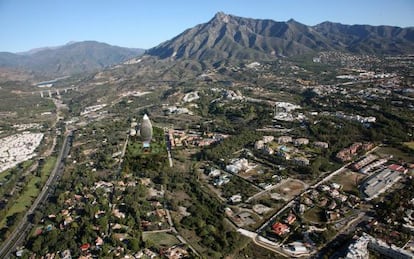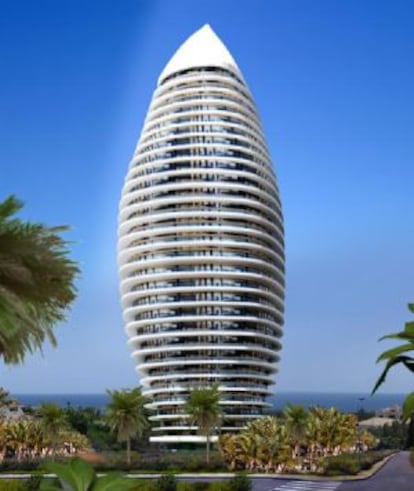Castles in the air?
Plans to build a series of skyscrapers in Marbella have angered local residents

Marbella doesn't want to be Benidorm, or Singapore, Hong Kong or Dubai. The Mediterranean resort city, for decades a symbol of corruption and rampant property development, is now mobilizing against a plan approved by the Popular Party-controlled administration to build five, 50-story skyscrapers. Ángeles Muñoz, the mayor, has now backed down, but the case raises a number of interesting questions about the lessons learned from Spain's boom-and-bust construction frenzy.
Pedro Rodríguez, president of property developer Sierra Blanca Properties, says he is puzzled as to why his plan to build a 30-story tower in Marbella has angered so many people. "Marbella has to compete with the rest of the world, with Dubai, Miami, and Singapore, and this project puts the city on the 21st-century map," he says from his office, which looks out on to the so-called golden mile. As far as the eye can see, every inch of the surrounding land has been developed.
Rodríguez outlines his vision for the city. "It makes no sense to build unless you do something exceptional." Which is what he thought his 115-meter-high tower filled with 114 luxury apartments, each selling for a minimum of 1.5 million euros, would be.
He says a house with a swimming pool is expensive to run, and a drain on resources for somebody who is only going to use it during certain periods of the year. An apartment in a luxury tower not only has lower maintenance costs, but has sea views. He says he has financing for his project, and could sell every apartment before even laying the foundations.
People no longer see developers as acting in the city's best interests"
After spending several years in New York, where he set up a travel agency and invested in a charter airline, he decided to return to Spain in the mid-1980s. "In 1985, when Spain joined the European Union, I read an article in a magazine explaining that people and businesses were moving from the northern United States to the south: costs were lower, and the weather was better. I thought that something similar would happen in Europe, and so I came to Marbella." His tower, which he says would be designed by Ricardo Bofill, would be his crowning moment.
On November 22, Marbella city council gave him the initial go ahead, with one month for anybody opposed to the project to present their case.
As soon as she saw the plans, Carola Herrero, a local architect, began rallying her forces, determined to prevent the tower from being built. It is significant that opposition has not just come from environmentalists, but from other property developers as well.
Rafael de la Fuente, a retired former PP local councilor and manager of two of Marbella's best hotels, explains his opposition to the project. "Skyscrapers are dangerous. When I was younger I saw the way they ruined Torremolinos. It used to be the number one tourist destination in Spain: it took just six years to destroy the place. People coming from northern Europe do not want that. Marbella is unique, and we cannot destroy it."

Juan de Orbaneja, a local property developer, agrees: "It doesn't matter how nice it looks, if you stick a tower up it breaks the skyline and tends to create a domino effect. Soon there are others going up and there is no way to stop them." Nobody is disputing that Marbella has been built up, but it has to be said that there is a certain architectural homogeneity. "Nobody has dared to build skyscrapers here. The highest we have is 20 stories. When Franco saw it he asked what it was. He was told that it was the first of some 10 that would be part of a large complex. He put a stop to it immediately," says Carola Herrero.
Rodríguez rejects the arguments of his opponents: "What do they mean by a style of architecture in this city? There are many different styles in Marbella: Arabic, European, buildings that date back to the 1960s... and there are at least four towers already." He says there are a number of projects on the table that involve skyscrapers, including a plan to develop a new marina.
Antonio Flores, a local lawyer, says the police investigation into corruption in the city - which has seen dozens of people, among them two former mayors and other officials, jailed - has raised awareness among residents that they do not have to accept City Hall's proposals. "People here no longer see property developers as acting in the city's best interests. They are very wary of big projects like this," he says.
City Hall has sought to distance itself from the plans, saying that if there is no consensus on building skyscrapers, they will not go ahead, at the same time, accusing opponents of manipulating the facts. "Our intention was simply to generate wealth and jobs, and building up rather than out, seems the best way to do that," says a spokesman.
So far, City Hall has not said whether it will revoke its initial permission or whether the halt is temporary. Opponents fear that the PP-run administration is hoping the fuss will die down and that the project can still go ahead, and so are keeping up their campaign. "Perhaps we can finally show people that we are not a bunch of sheep," says De la Fuente.
Tu suscripción se está usando en otro dispositivo
¿Quieres añadir otro usuario a tu suscripción?
Si continúas leyendo en este dispositivo, no se podrá leer en el otro.
FlechaTu suscripción se está usando en otro dispositivo y solo puedes acceder a EL PAÍS desde un dispositivo a la vez.
Si quieres compartir tu cuenta, cambia tu suscripción a la modalidad Premium, así podrás añadir otro usuario. Cada uno accederá con su propia cuenta de email, lo que os permitirá personalizar vuestra experiencia en EL PAÍS.
¿Tienes una suscripción de empresa? Accede aquí para contratar más cuentas.
En el caso de no saber quién está usando tu cuenta, te recomendamos cambiar tu contraseña aquí.
Si decides continuar compartiendo tu cuenta, este mensaje se mostrará en tu dispositivo y en el de la otra persona que está usando tu cuenta de forma indefinida, afectando a tu experiencia de lectura. Puedes consultar aquí los términos y condiciones de la suscripción digital.








































